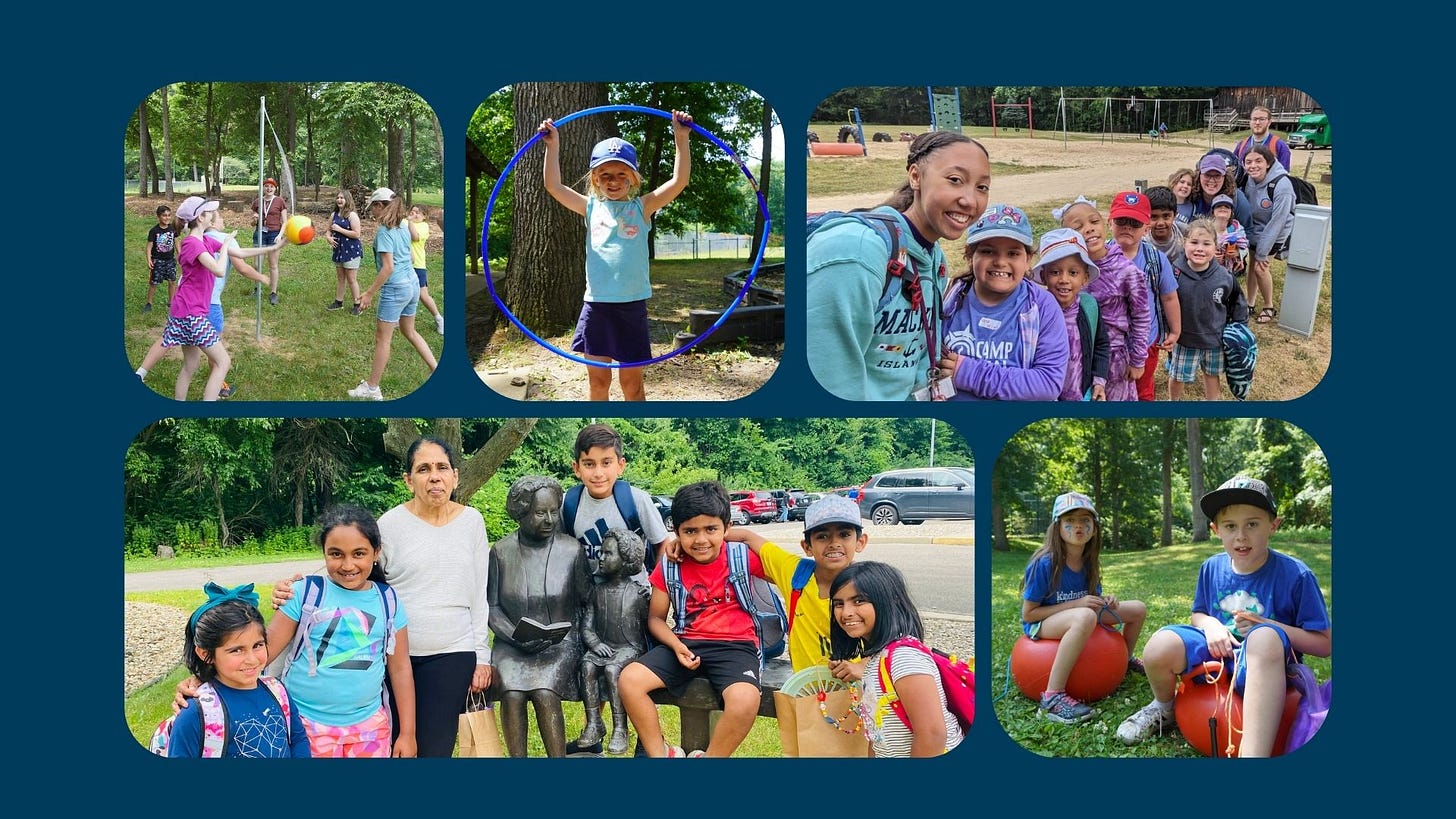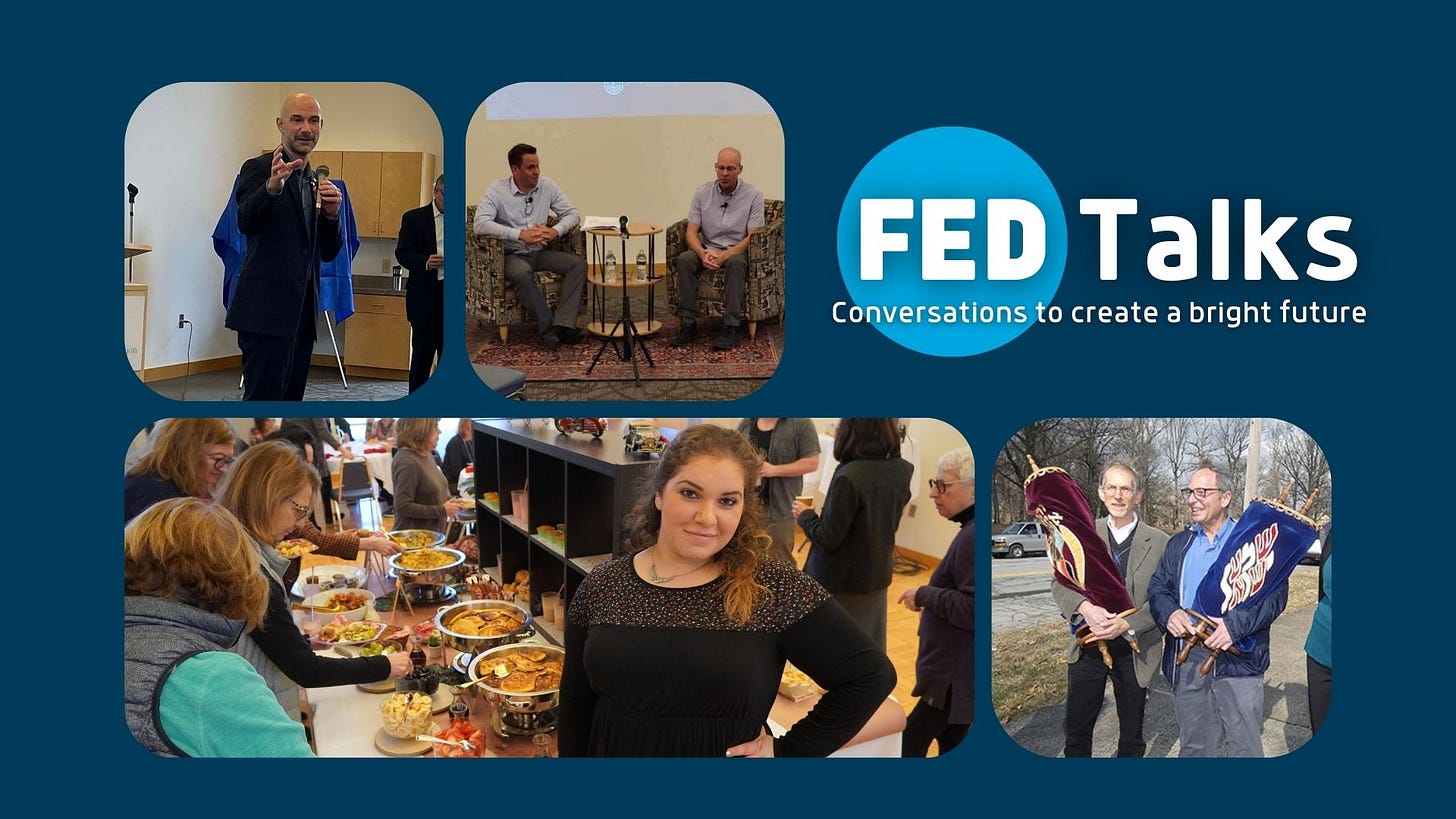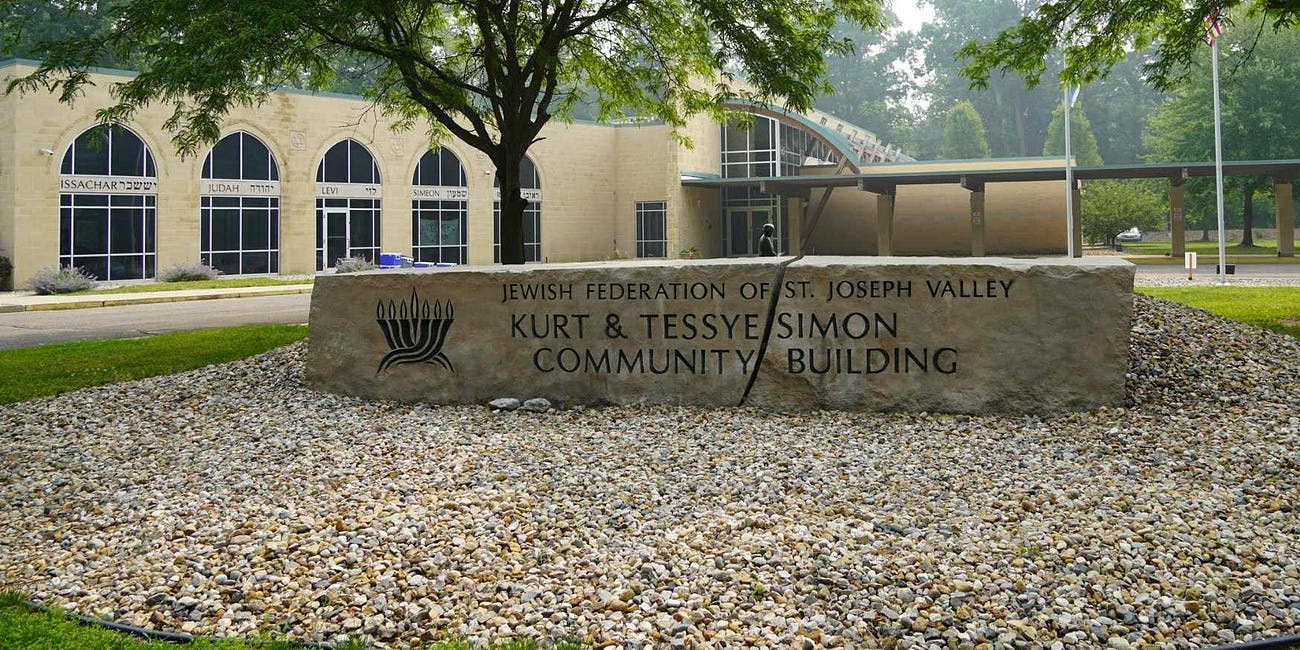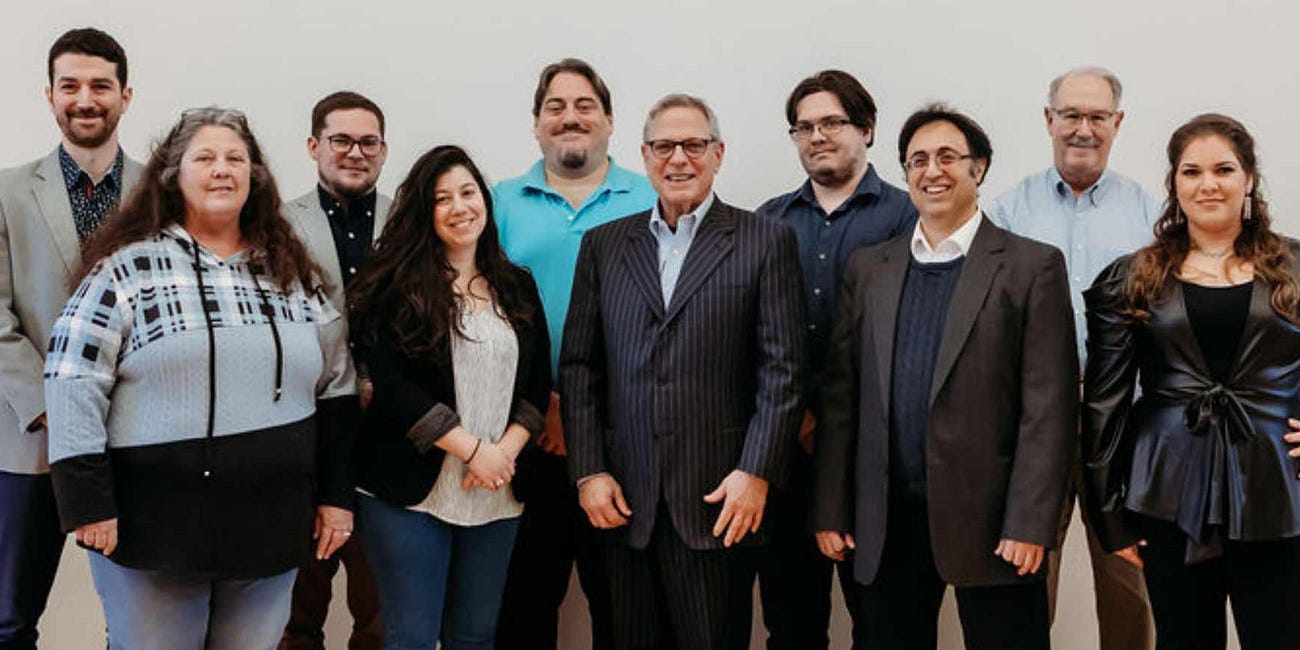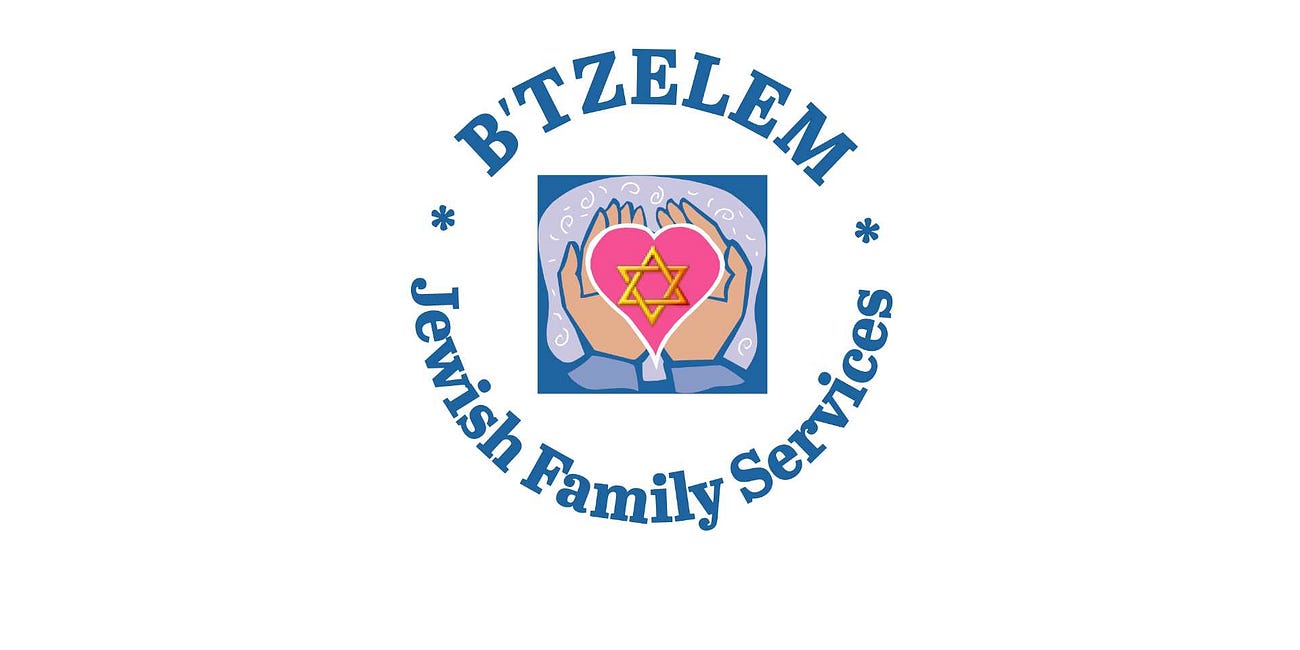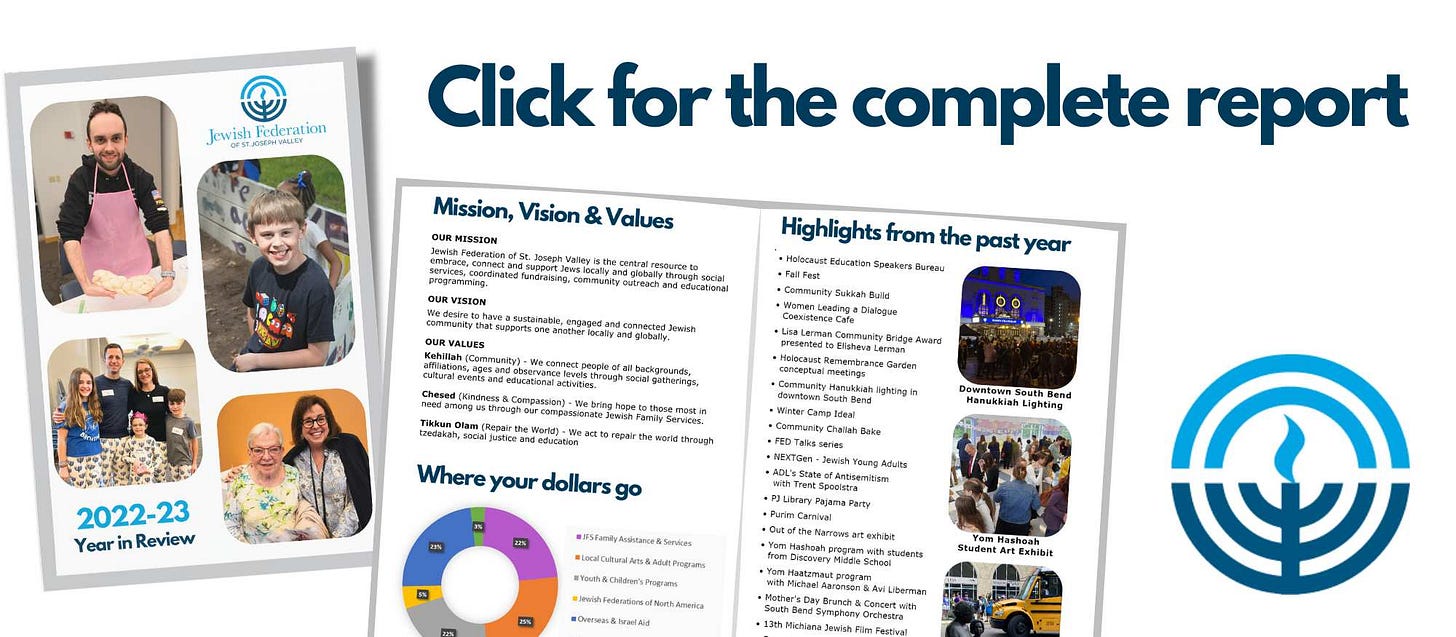Community Vital Signs
Checking the pulse of the Michiana Jewish community with remarks from Moshe Kruger at the 2023 Annual Meeting on June 28th.
Moshe Kruger delivers remarks at the 2023 Annual Meeting of the Jewish Federation of St. Joseph Valley.
Highlights
🙌 Moshe expresses gratitude for the dedicated and passionate professional staff of the Federation.
🌟 He highlights the accomplishments of the Federation’s programs and services over the past year.
🏢 Temple is going through a transition, and the Federation has extended a helping hand.
🌍 Moshe discusses the challenges faced by the Jewish community at large, including a shortage of Jewish professionals.
💡 He emphasizes the need for adaptation and innovation to address the changing landscape of Jewish life.
Video Transcript
And here's how I'd like to begin; I see that Dan Cossman is in the room in the back with his camera. Dan you just want to wave really quick to the folks. I'm just going to run down my staff list. Dan Ravitch, probably out by the fire. John Ravitch, out by the fire. Judy, I believe is in the kitchen. Nancy is probably up in Southwest Michigan. Rabbi is in the kitchen. Shirley is somewhere on the Federation campus. Steve is behind the tech desk. And I know Bob Feferman and his wife are in Israel.
And here they are, fine people, the finest. Team Fed. I got to tell you they're impressive. So, I began my state of the Federation remarks with a grateful heart, grateful because we are incredibly fortunate to have a professional staff that possesses a love for the Jewish people, who serves our community with passion, creativity, and I might say with a roll up your sleeves, old-fashioned, get it done work ethic. They're amazing and a joy to work with. Please join me in showing them our heartfelt appreciation.
I could not be prouder of them and their accomplishments over this past year, from Camp Ideal to our community relations work.
Date night, the Yom’s, our holiday programming, Bagels & Dragons, the PJ Library Pajama Party, the Holocaust Education Speakers Bureau, with over 60 classroom presentations this year. And then of course we had the amazing 13th Annual Michiana Jewish Film Festival, NEXTGen, FED Talks, the Jewish Family Services fundraising appeals, Partnership events, educational classes, and so much more.
For example, the Mother's Day brunch and concert with the South Bend Symphony String Quartet, some of you were there. In short, with programs and services that appeal to diverse interests and needs, I will tell you this, the Federation is getting better at bringing people together and making our community stronger. So tonight, I want to talk about three things relative to our future: where we are, why we can't stay where we are, are you with me? And three, what the change drivers are shaping our community and Jewish communities around the country. In brief, where we are, we are in transition.
Temple has sold their home on Madison Street and are contemplating next steps. Sinai is also actively contemplating their future, and our good friend Rabbi Friedland has publicly used the "R" word, retirement. And our Orthodox community is enjoying new leadership at HOC and MTC. And of course, we have other segments in our community who are wrestling with their own unique challenges. But let me focus on Temple for just a minute.
Like a good neighbor, Federation extended a hand to Temple as they navigate their next chapter, and I'm happy to report that phase one of the Berman-Brenner Family Sculpture Garden installation is complete.
The garden sculptures have been relocated to the Federation campus from Temple Beth-El. But we still have some finishing work to do, including some landscaping. Now, did you notice the sculptures as you were driving in this evening? They are located in the grassy area out in our circular drive, in front of the building. And once the work is done, a rededication invitation will go out to the community.
So, in addition to being a new home for the sculptures, from all accounts, I'm hearing that Temple's hybrid Kabbalat Shabbat services and onegs in this community room have been lovely, really lovely, as has the coordinated programming we've done with Temple Sisterhood, the Simon Foundation and the Simon Fund for Holocaust Remembrance.
So, in speaking of Temple events at the Federation, keep this date in mind: mark your calendar for Friday, July 21st for a special Temple Kabbalat Shabbat community service, which will feature community musicians, who will add, I'm sure, great ruach or spirit as we say, to make this Shabbat service both memorable and enjoyable, and weather permitting, we will have an "Ooh La La" oneg out here on the patio. Oh! Did someone mention patio?
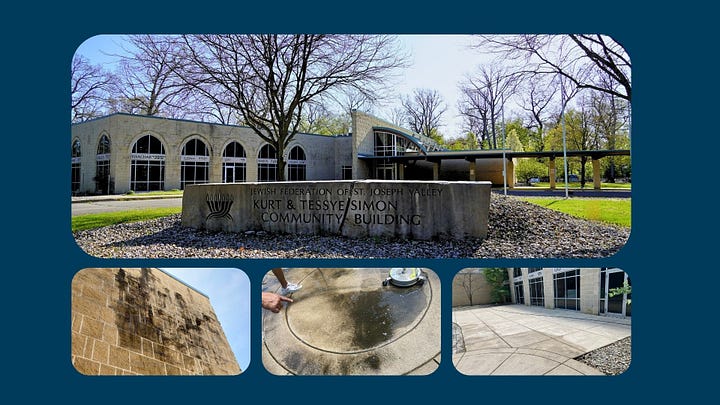
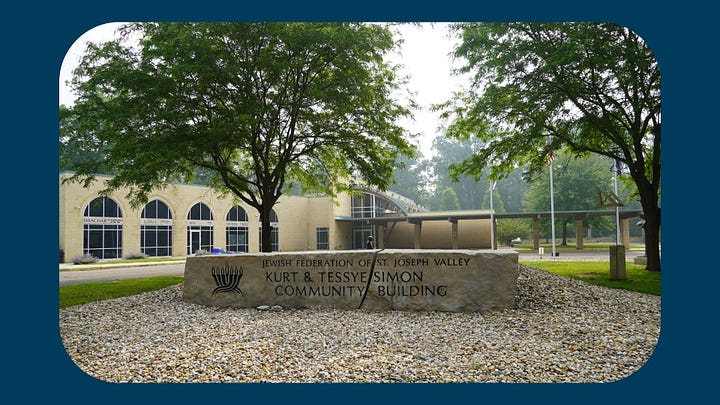
I'm pleased to report our patio and campus sidewalks and building have just had a long overdue washing. The campus is now clean, bright and inviting. So please join your friends on Friday, July 21st. The service begins at 5:30. Now, as Alon remarked in his report, it's been a remarkable year for the Federation, and I could not agree more we are building momentum, and I think people are taking note.
You know we've come a long way since the Jews first set foot in North America in 1654, just 34 years after the Mayflower arrived in Massachusetts, and by the late 1800s, Jews started trickling into what we now call Michiana. If we fast forward to 2023, the American Jewish population is estimated at approximately 7.6 million, which accounts for about two-point four percent, more or less, of the total population in the United States. But if you zoom out to the worldwide population, we are a very minuscule, 0.2 percent, and yet astonishingly, did you know this fun fact? Jews have won approximately 22 percent of the Nobel prizes. To say that this is astonishing is, in my view, an understatement.
Of course, there are many interesting metrics we could examine regarding the Jewish people, but the metric that the Federation is most interested in is measuring the health and well-being of our community right here in South Bend Michiana. In our own little Jewish world, the community vital signs I would say are mixed. As previously mentioned, on the south side we are seeing new leadership and growth in our Orthodox community. That's good. In our other local synagogues, we do see their great spirit and teamwork, but I think we'll agree we also see long-standing membership and building and financial, and yes, even leadership challenges.
I would go on to say that the denominational framework which once provided the scaffolding for Jewish life and congregational affiliation is no longer quite as compelling or relevant, at least according to the Pew research of 2020. Overall, about a quarter of U.S Jewish adults, that say about 27 percent, do not identify with the Jewish religion. However, the bright spot is that they do consider themselves to be Jewish ethnically and or culturally, or by family background. They may have, of course, Jewish parents or were raised Jewish, but listen to this, they answer the question about their current religion by describing themselves as an atheist, agnostic or nothing in particular, rather than as Jewish. And among Jewish adults under 30, 4 in 10 describe themselves this way. So, what does this portend for us here in our beloved community?
I'll come back to that question in just a moment. But I'd like to splash, if you will, a little bit more paint on our "where we are" canvas. Most of us in this meeting hall tonight are old enough to recall The Six Day War, when Israel was the most exciting feature of Jewish life, infusing Jewishness with dignity and energy, joy and purpose and commitment. However, the ongoing conflict with the Palestinians and the challenges of building a Democratic Society are taking a toll on Zionistic interests and commitment. If in the past the answer to the question why Israel was clear for many Jews, today we might say that the Jewish homeland struggles to find and redefine its role in the lives of North American Jews. And this is why our partnership program with the Western Galilee region in Israel is so important. It brings us this one-of-a-kind, person-to-person connection, as we saw when the women's delegation visited us here in South Bend.
And, as an aside, I'll be joining other Federation executives and lay leaders who partner with our Western Galilee folks in Fort Worth, Texas for a four-day strategic powwow next week and joining me on that trip will be our co-chair of Partnership, David Ravitch, and what we'll be exploring is what the heck is going on in America and in Israel. Because the way of being together, our way of organizing our collective lives, you may agree has changed, and has evolved as the world has transformed. And although this concept of community is so central to Judaism, and I would say to the ethos of the Jewish people, we face unparalleled challenges as U.S Jews. In fact, many would say that our communal organizations are in crisis.
We live in a world where many of the old patterns of behavior and affiliations and identity have changed. And moreover, our Jewish community problem is further aggravated because right now there are not enough professionals to fill open positions across our broad Jewish landscape. We faced shortages, acute shortages in some instances, of rabbis and educators and cantors, organizational leaders, camp staff, chaplains, youth leaders, and yes, even lay leaders. And as Alon mentioned, here at our Federation we too are experiencing challenges in finding a new program director.
All this is to say that understanding where we are is creating a pervasive sense that the rules of the game are changing. The rules of the game are changing, and that the ideas and beliefs, and our institutions and experiences that were once the central building blocks of our political and religious and our social and familial and our individual universes need to be rethought, need to be reimagined, and where relevant, reinvigorated and reclaimed. Because if you were to ask me where we are is simply not sustainable.
What then in turn does this rupture in opportunity for transformation in the fabric of Jewish life mean for our local community? Well this much I know. Change happens at the pace of trust. Change happens at the pace of trust, and this is why FED Talks was created, with this idea in mind, to build trust through community conversations, while also capturing the essence and the contours of our current thinking about our shared future.
And permit me to say, whatever our direction that our community decides to go in, please, please let us listen to our youth and yield to their powers. Our youth is our future and I believe they will lead us to better solutions.
So, when we read Deuteronomy 30:19, "I put life and death before you therefore choose life." Choosing life, the most precious of all things. In fact, we are commanded to choose life. Why? So that we and our children can live. To live means having a secure future. Well, it turns out we can't take our future for granted, can we? So, our future really is a work in progress. It is up to us to define and move towards it.
Oh boy friends, the hour is getting late. So let me make my final wind up and pitch. Turning to our future, we look with hopeful and inspired eyes to what comes next for the Jewish community of Michiana, with determination and confidence we will embrace the challenges and opportunities by crafting a new narrative, a narrative that's inviting, a narrative that has an innovative vision for what we can be, and we will be judged. We will be judged, as every generation is, not so much by what we've accomplished in the past, no, but by the foundations we lay for even a brighter future. So, with this in mind, and this coming year with my new board, we will endeavor to create an intentional, evidence-based and opportunity-focused master plan for the future of Michiana's Jewish community.
Now, I just said a mouthful of fancy words. What I'm really trying to say is with joy and with harmony, and with growth to engage Jewishly, in a safe way, in a secure way, in a way without judgment, we just might have a chance. We will be guided in this process by insights and ideas from you, our current community members, and the experience and expertise of others who may know something about innovative community building. And we'll also have to listen as I've just mentioned, to the next generation of Jewish leaders, especially those who might pursue those dreams here in Michiana. Yes, the master plan will be systemic, holistic and integrated. It will be woven together within a big picture vision of Michiana's Jewish future. We will set out specific objectives for creating this dynamic and welcoming community.
And if I can flip to my next page, I want you to listen carefully to what I say next. To be sustainable, to be a sustainable community, we need to work together outside of our traditional silos and offer opportunities to attract and retain young people to engage and connect with Jewish Michiana, on terms that reflect their passions, their interests and models for belonging, rather than through the paradigms of the past, and if you heard Dan Feferman's webinar, this past weekend he spoke to some of these very same issues. Friends, we cannot simply recycle yesterday's solutions for today's challenges, period. We need bold and innovative thinking. This is the basis of what I'm calling Vision 2025, an open dialogue, an open dialogue for a three-year community plan to bring us together to work for a common cause.
A very brief story: when Theodore Herzl stood up and called for a movement to build the Jewish Nation, most people said you're out of your mind. You are out of your mind. However, a few people stood up and said yes, this will be difficult, but I'm in. This is the crux of great change, isn't it? To go against the grain, to do something audacious, and so, I submit this is the opportunity and moment we must seize. And I will guarantee you this, life will always be richer when we see the possibilities, when inspired people step up and say count me in, because they see the value in our shared future.
Tonight, as I stand before you, I am grateful. I am humbled. I'm ready to give you and this community my best effort. And in saying this, I am only able to do this because of a very special person in my life, my wife Karen Richmond, who's sitting here in the front row. I want to thank you, Karen. I want to thank Karen for all of your love and support.
So, in conclusion, we have journeyed together to reach this new season. We have not done it alone. Let's keep reaching for the stars, the Federation is counting on you to partner with us in this effort. Our community and the Jewish future depend on it. May our deliberations and actions we take, let them be blessed, and may we be blessed with the courage and the wisdom and the chutzpah to sit, to stay focused on our core values, and true to our community purpose, as we dream what is possible in fulfilling the promise of our future.
A remarkable year of growth
A year ago, I received the “metaphorical gavel” from Mike Kirsch when I became the president of the Jewish Federation’s Board. Mike, Moshe Kruger (who had the misfortune of becoming the Executive Director right at the start of the pandemic), the Federation’s board, and the staff members had the near-impossible task of navigating the complexities of COVI…
Thank you. Toda Raba. We are grateful.
MOSHE KRUGER - The expression of gratitude, conveying our sincere thanks and appreciation, is essential to our Jewish identity and tradition. The first words of our morning prayer, Modeh ani, impel us to start each day with a grateful heart by saying: “I thank you.”
Caring for the community
RABBI FRED NEBEL - The mission of Jewish Family Services (JFS) is to provide helpful and caring services to the Jewish community, infused with Jewish values, in order to improve and strengthen the quality of lives in our community. JFS strives to help when life presents periodic or chronic challenges. We try to alleviate these challenges through a relationship-based model …






